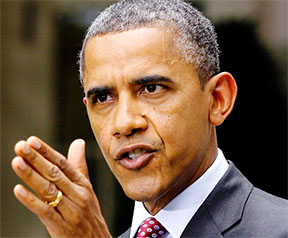(Jamaica Observer) It was not a scheduled item on the agenda for discussion when United States President Barack Obama met with Jamaica’s Prime Minister Portia Simpson Miller and seven of her Cabinet ministers on Thursday, April 9 at Jamaica House, but the matter was destined to come up.

In fact, Obama placed the treatment of the lesbian, gay, bisexual, and transgender (LGBT) community in Jamaica as one of the first topics to be discussed, following opening statements by the Jamaica team and their United States counterparts, an impeccable political source informed the Jamaica Observer.
“The two original items that Obama and his team had down for discussion were the Jamaican economy, with particular reference to Jamaica’s agreement with the International Monetary Fund (IMF); and energy, bearing in mind the situation with the PetroCaribe oil deal with Venezuela,” the source disclosed to the Sunday Observer.
“Jamaica had listed the wiping of the criminal record of (National Hero) Marcus Garvey and a plan that involved the training of nurses and sending them to work in the United States, as its two main points for the talks,” the official went on.
Simpson Miller’s Cabinet ministers present were: Robert Pickersgill, Dr Peter Phillips, Phillip Paulwell, Derrick Kellier, Anthony Hylton, Ronald Thwaites and AJ Nicholson.
Obama politely conveyed his Administration’s “dismay” that Jamaica had not moved fast enough in ensuring that the rights of the LGBT community were being respected and even protected.
The US president implored his Jamaican hosts to ensure that the sexual preference of all Jamaican citizens be respected.
Jamaica is regarded as a country that is intolerant to “irregular” sexual conduct, and has even been labelled by human rights groups as the most homophobic place on Earth, what with reports of a high level of crime and violent activities directed at members of the LGBT community.
The US State Department three years ago even described Jamaica as a country in which “homophobia was widespread”.
Jamaica does not allow same-sex marriages, as do some countries, including the USA and England, but those involved in non-traditional sexual activities say there has been a rise in the number of Jamaicans who have now become so inclined.
Anti-gay activists have insisted that violence against members of the LGBT community is not carried out by ‘straight’ people, but members of the LGBT community themselves, who are often accused of unleashing considerable punishment on those in their flock who transgress, including beatings, stabbings and shootings, oftentimes resulting in death.
The matter of the treatment of the LGBT community was raised only once publicly during Obama’s 22-hour stay on the island — during a United States Embassy-organised Town Hall meeting at the University of the West Indies.
After his “greetings, massive … wah a gwaan Jamaica” introduction, Obama highlighted challenges faced by members of the LGBT community, with specific reference to Angelie Jackson, whom he described as a lesbian.
“When she was 19, Angelie and a friend were kidnapped, held at gunpoint, and sexually assaulted,” the US president told a packed auditorium. “As a woman and as a lesbian, justice and society weren’t always on her side, but instead of staying silent, she chose to speak out and started her own organisation to advocate for women like her, in order to help them push back stereotypes and give them some semblance of their own power, and she became a global activist.
“But more than anything, she cares about her Jamaica and making it a place where everybody, no matter your colour, class or sexual orientation, can live in equality,” Obama said.





